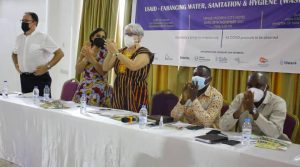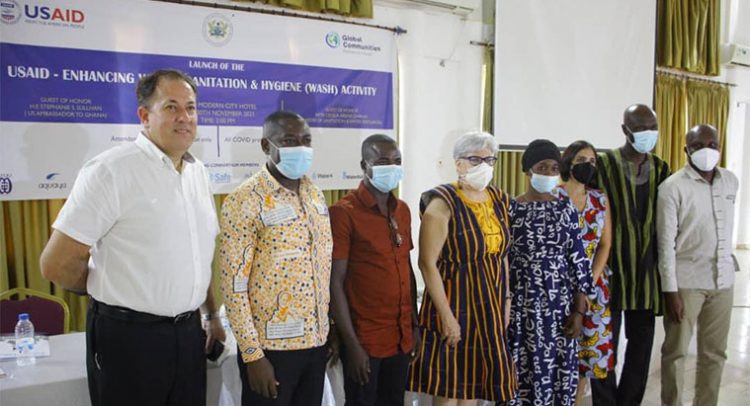The United States has committed $45.5 million over the next five years to improve water, sanitation, and hygiene (WASH) services in Ghana.
The E-WASH will support MMDAs to enable 70 percent of target communities to be certified as Open Defecation Free (ODF) and 60 percent of households to adopt and sustain improved WASH practices including the transformation of gender roles and norms.
The E-WASH will work in 30 districts across six regions in Ghana namely Oti, Northern , North East, Savannah , Upper East, Upper West.
The U.S. Government, through USAID, will work together with the Government of Ghana (GOG) to enhance governance and planning for WASH projects, strengthen sustainable financing, improve private sector engagement, and accelerate the adoption of healthy hygiene practices. The project will focus on six regions in northern Ghana: Upper East, Upper West, North-East, Northern, Savannah, and Oti Regions.
The United States Ambassador to Ghana Ambassador Stephanie S. Sullivan said the United States’ committed to supporting Ghana to achieve UN Sustainable Development Goal Six to Ensure availability and sustainable management of water and sanitation for all by 2030.
“Communities need clean water and healthy sanitation. Together we will continue to support individuals, communities, districts, and regions to achieve universal access to clean water and basic sanitation and hygiene services. This is an essential action during the COVID-19 pandemic, and beyond, to improve the health of Ghanaians and their economy.”
She noted that the initiative aims to provide 300,000 people with access to basic sanitation services and provide 250,000 people with access to basic drinking water services and that over the next five years, USAID and partners will work with the Minister of Sanitation and Water Resources, District Assemblies, environmental health officers, community leaders, and the private sector to strengthen the governance financing of WASH services.

“This new effort will ultimately empower citizens to adopt sustainable, long-term WASH behavior change to improve their health and economic opportunities.The project builds on over a decade of partnership between the U.S. Government and the Government of Ghana on water, sanitation, and hygiene and overall healthcare delivery systems. Over the past five years, through the WASH for Health project, 150,000 people gained access to basic drinking water services and 200,000 gained access to improved sanitation facilities. WASH for Health built and rehabilitated 200 water boreholes, providing an essential source of water to hospitals, clinics, and schools.In addition, five, small-town water systems are providing clean water to 50,000 people. Also through WASH for Health, a ground-breaking partnership with the private sector led to the development of the Digni-loo, a more durable latrine which is 80% cheaper than similar latrines. The model is now being used in countries around the globe.”
Ambassador Sullivan said the United States government looks forward in supporting government of Ghana to ensure that everyone have access to safe, reliable drinking water and basic sanitation services.
“ We will continue to support individuals, communities , districts ,regions to achieve universal access to clean water , sanitation and hygiene services.”
Mr. Donnan Kobla Tay, Director of Water at the Ministry of Sanitation and Water Resources, who represented the sector minister appealed to the regional ministers, MMDAs, and institutions to ensure that they play their roles in making sure that the E-WASH project is successful.
FROM Eric Kombat, Tamale


